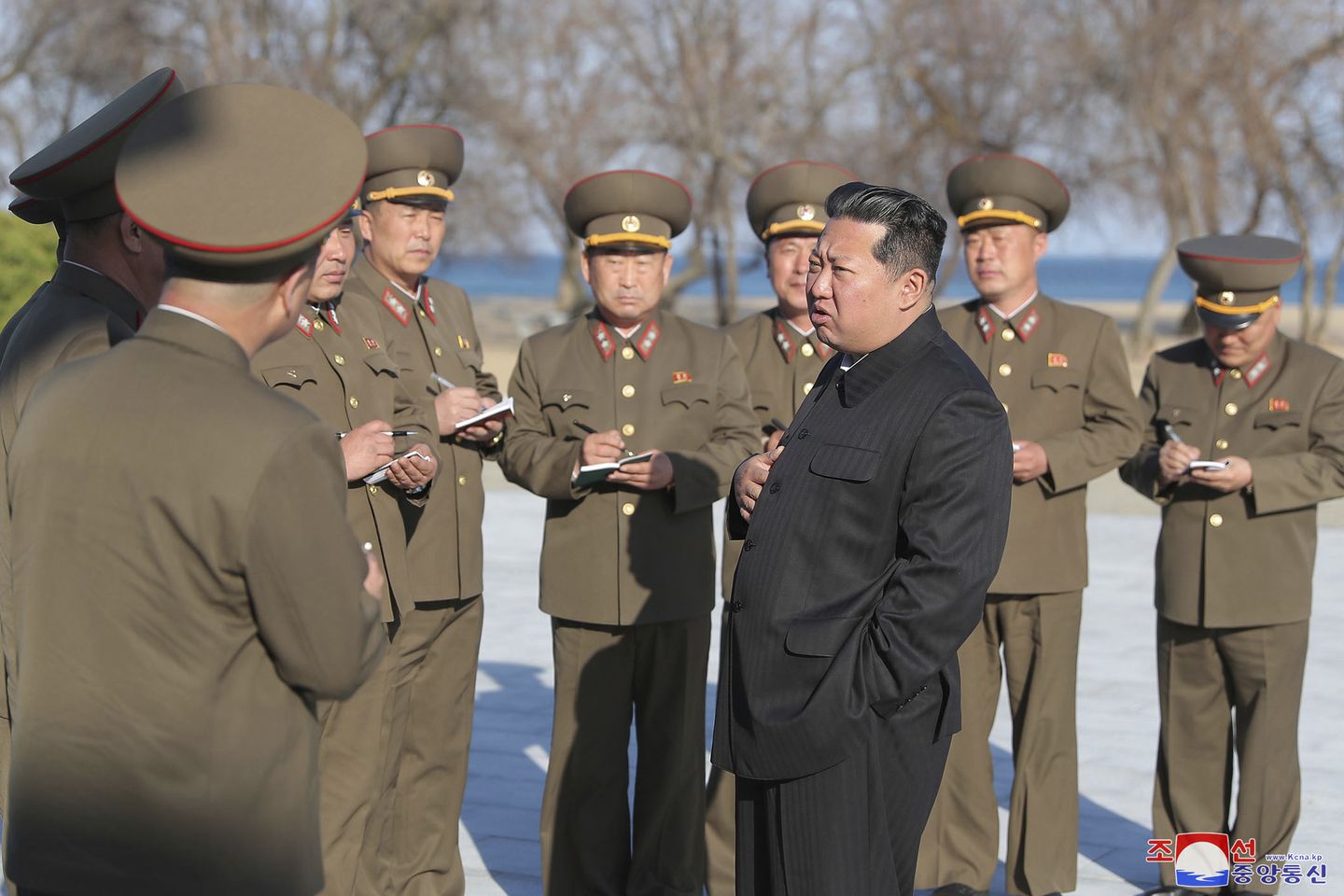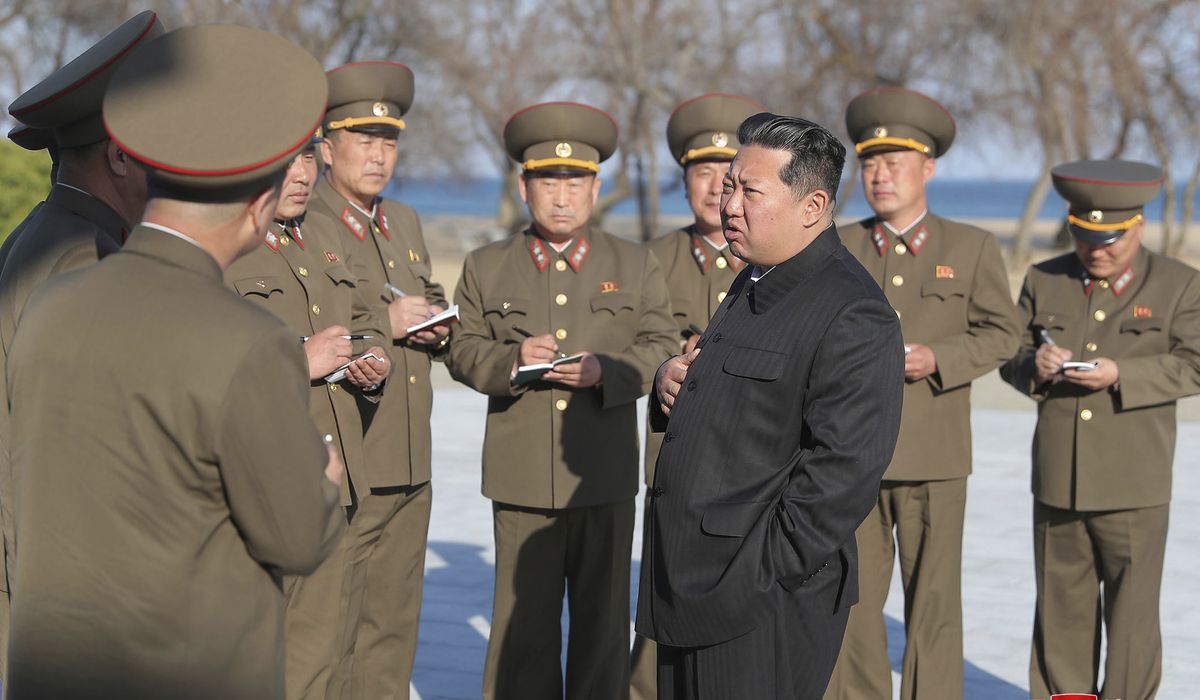

North Korea will test a nuclear weapon before the end of the year and may do so as soon as next week, according to U.S. national security analysts, who say Pyongyang is increasingly eager to put pressure on President Biden after more than a year of watching his administration’s foreign policy moves.
A nuclear test by Pyongyang would shake up the regional and global security landscape at a time when South Korea is preparing to swear in a hawkish new president and the U.S. and its top allies are already consumed with the fallout from Russia’s invasion of Ukraine.
North Korean leader Kim Jong Un, whose last nuclear test in 2017 sparked intense brinkmanship that eventually resulted in a pair of high-stakes summits with former President Trump, is seen as eager to set Seoul on edge as it goes through its first leadership transition in five years.
Incoming South Korean President Yoon Suk-yeol, a conservative whose inauguration is scheduled for May 10, has vowed to coordinate more closely and robustly with the United States and be less conciliatory than outgoing President Moon Jae-in toward Pyongyang. Park Jin, tapped to be foreign minister under Mr. Yoon, said the Moon administration’s policy of engagement and rapprochement with Pyongyang, while well-intentioned, had reached its “limit.”
“The current appeasement policies cannot stop North Korea from escalating tensions, and it is time to make practical changes to North Korea policies,” Mr. Park told reporters at a briefing this week.
The political shift in Seoul comes amid mounting provocations by the Kim regime, which after a lengthy pause has carried out a growing number of increasingly powerful ballistic missile tests this year while ignoring calls from the Biden administration for a return to diplomatic talks that broke down in 2019.
Adding to South Korea’s alarm, North Korea said Sunday it had successfully tested a new missile that could hit Seoul from the frontlines with a smaller, “tactical” nuclear warhead. Even with a more limited range than an ICBM, the missile could prove more of a threat to South Korea itself.
The quickened pace of the tests, including one of an intercontinental ballistic missile (ICBM) in late March, is Mr. Kim’s way of “trying to get some kind of movement out of the U.S. and the South Koreans,” said Bruce Bechtol, a former Defense Intelligence Agency officer who teaches at Angelo State University in Texas.
“I’m convinced that the next thing is going to be a nuclear test,” Mr. Bechtol told The Washington Times, describing the current wave of provocations as similar to 2017, when Pyongyang carried out multiple ballistic and ICBM launches, and conducted its sixth and largest nuclear test, detonating a hydrogen bomb underground, in an early challenge to the new Trump administration.
“They want to test Biden now that he’s been in office for a year,” he said. “They want to put some pressure on him, so the next thing they need to show off is their nuclear program and they’ll probably do that by carrying out a nuke test with a higher yield that what they tested in 2017.”
The 2017 test carried an explosive yield in excess of 100 kilotons TNT equivalent, a dramatic increase from the less than 25 kiloton yield of previous tests in 2013 and 2016.
“Kim Jong Un and his inner circle want to be able to say that whatever they test going forward has a higher yield than the 2017 test, which had a lot higher yield than any previous test they had carried out,” said Mr. Bechtol. “They want to make a splash to get people in the U.S. and Seoul saying, ‘Gosh what do we do now?’ That is what the North Koreans do to get us back to talks on terms they want. They believe that carrying out such a test might get us to ease sanctions in exchange for rejoining talks.”
As for the timing of a nuclear test, Mr. Bechtol speculated the North may wait until Mr. Yoon is inaugurated on May 10 or longer. “I think that will happen by the end of this year,” he said.
North Korea watchers have been especially on edge since mid-March, when reports emerged that satellite imagery had picked up signs of construction at the North’s Punggye-ri nuclear test site for the first time since the Kim regime claimed to have shuttered the site in 2018.
The regime carried out all six of its previous nuclear tests between 2006 and 2017 in underground tunnels beneath a mountain at Punggye-ri. North Korean officials invited a small clutch of foreign journalists to watch as explosives were used to destroy the entrances to Punggye-ri’s tunnels in a show of goodwill ahead of the first Trump-Kim summit in Singapore in 2018.
Mr. Kim signaled at the time that he would halt ICBM and nuclear tests while participating in diplomatic talks. After the Singapore summit and a subsequent Trump-Kim meeting in Hanoi failed to result in a major sanctions relief or a denuclearization deal, the Kim regime began ramping up testing of short-range missiles in 2019.
By the end of 2019, North Korean state media had reported that Mr. Kim no longer felt bound by the self-imposed moratorium on nuclear and ICBM tests.
Getting ready
More recent events indicate Pyongyang has “clearly broken the ICBM portion of the moratorium and satellite imagery now shows they are doing excavation work on Punggye-ri,” said former CIA Korea Deputy Division Chief Bruce Klingner.
“They’re working on the test site in such a way that indicates that they’re preparing to carry out a nuclear test,” said Mr. Klingner, a senior fellow with the Heritage Foundation, told The Times.
While it’s unclear when a major test will occur, Mr. Klingner predicted it could happen as soon as the April 25 anniversary of the founding of the Korean People’s Army, the North Korean military. He noted there are signs Pyongyang is preparing to hold a military parade for the anniversary.
“They may also do another ICBM test on the 25th and or a nuclear test,” Mr. Klingner said. “Whether it’s April 25th or not remains to be seen, and it could be a small or large nuclear test.”
North Korea continues to conduct a flurry of missile tests, including one last Sunday of a projectile North Korean state media claimed was a new type of tactical guided weapon designed to boost Pyongyang’s nuclear targeting capabilities.
Earlier launches late last month triggered debate among U.S. and South Korean officials over precisely what missiles the North Koreans had tested, although most analysts agree one of the tests — on March 24 — marked the Kim regime’s most powerful ICBM test to date.
The regime claimed via state media to have tested an Hwasong-17, a massive missile first revealed at a 2020 military parade. However, U.S. and South Korean analysts have since said the March 24 test was likely an upgraded version of the less powerful Hwasong-15, which North Korea had first tested in 2017.
The Biden administration has responded with caution. The White House dispatched North Korea special envoy Sung Kim this week to meet with his South Korean counterpart and show a unified front in condemning the North’s provocations.
Appearing in Seoul on Monday, Mr. Kim said the U.S. and South Korea are aligned on the need for a strong response to the missile tests, but remain open to dialogue with the Kim regime.
“We agreed on the need for a strong response to the destabilizing behavior we have seen,” Mr. Kim told reporters. “We also agreed on the need to maintain the strongest possible joint deterrent capability on the peninsula.”
Mr. Klingner, meanwhile, said the Biden administration should take action now by enforcing sanctions that Washington has already authorized to be imposed on North Korea, including against hundreds of North Korean entities, as well as on several Chinese banks that U.S. officials say have helped Pyongyang evade sanctions.
Previous administrations, including the Trump administration, have all stopped short of fully enforcing the sanctions, Mr. Klingner said, adding that full enforcement would “make it more difficult for North Korea to make progress on its missile and nuclear programs, and could work to inspire them back into diplomacy.”
But given the closed nature of the North Korean regime and the central role its weapons programs play in national security policy, “there really is no way to deter them from doing another test.”
“They clearly have shown for decades that they’re determined to have nuclear and missile programs,” Mr. Klingner said, adding that “there’s much more pessimism across the community of Korea watchers right now that we can do things to prevent North Korea’s further development of these programs.
